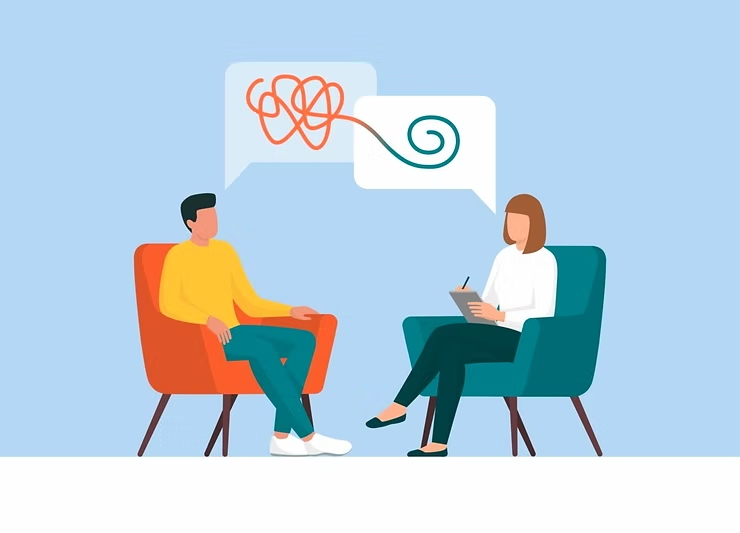Imagine this: you feel stressed, overwhelmed, and panicked. It feels like no one understands what you’re going through. You try to talk to your family and friends and either they don’t get it or they keep telling you “you should go to therapy.” You see on social media all the positive talk about, “therapy is cool” and “therapy helped me” or “therapy is normal.” Which is great and all, but “how do I find a therapist?” You could try googling “Therapists near me” but, holy moly! There are so many that pop up! You could try the therapist your best friend, colleague, or sister sees, but what if they aren’t a good match? It all feels overwhelming, so you don’t even try.
Listen, I’ve been there.
Embarking on a journey to find the right therapist can be a daunting task filled with uncertainties and stress, I get it. As a human being AND mental health therapist, I understand the importance of finding a therapist who fits your unique needs and fosters a supportive therapeutic alliance. In this blog post, we will explore the challenges you may encounter while searching for the right therapist. I also want to give you five essential tips to guide you towards finding the perfect match! Because finding the right therapist can feel a lot like dating. You have to know what you’re looking for to even put those feelers out there. And sometimes it isn’t a great match, which is annoying but totally normal. You don’t need to stay with the same therapist if it doesn’t feel right. So let’s dive into it.
First, Clarify Your Needs and Goals:
Before starting your search, take some time to reflect on your personal needs and therapy goals. Consider the specific challenges you are facing, the type of therapy you are interested in, and what you hope to achieve through therapy. This self-reflection will help you focus your search and find a therapist who specializes in the areas relevant to your specific needs. For example, maybe you’re struggling with graduating college and starting your career. With this you would want to look for a therapist that understands “life transitions.” Or maybe you’ve experienced a traumatic event and are having intense memories (flashbacks) from the event, you would look for “trauma therapy” or maybe even “EMDR.”
Second, Seek Recommendations and Do Your Research:
I know I said maybe your sister or colleague’s therapist wouldn’t be a great fit, which could be true. But that’s why it’s important to do your research too! Reach out to trusted friends, family members, or healthcare professionals who may have experience with therapy. Your primary care is a great place to start because they often have a referral list of therapists in the area you can check out. Personal recommendations can be valuable in getting insights into therapists’ approaches and effectiveness. Additionally, make use of online directories and professional associations to gather a list of potential therapists in your area. Research their credentials, specializations, and any reviews or testimonials available to narrow down your options.
Here are a few great online directories:
MentalHealthMatch.com
PsychologyToday.com
ThrivingCampus.com
TherapyDen.com
Third, Establish a Connection:
Creating a strong therapeutic alliance is essential for effective therapy. During an initial phone call or consultation, inquire about the therapist’s approach to treatment. This can include what theories they acknowledge, backgrounds they focus on, and models they use. This part may seem confusing, but if you ask them these questions, they’ll know what you’re saying: “What is your therapeutic approach?” – “What therapy models do you use most in your sessions?” – “Do you base your approach off any specific therapeutic theories?” – “Can you explain in layman’s terms what your therapeutic process would look like in each session AND overall?” This conversation will help you determine if their approach aligns with your preferences and if you feel a sense of connection or rapport. Trusting your instincts is crucial, as feeling comfortable and understood by your therapist is essential for successful therapy outcomes.
Fourth, Consider Practical Factors:
Therapeutic fit is obviously important, but so are the practical considerations. That looks like factors such as location, availability, fees, and insurance coverage. Determine whether you prefer in-person sessions or online therapy. Assess if the therapist’s schedule aligns with yours and if they accept your insurance or offer affordable payment options. Remember, therapy is an investment! It is going to take effort, time, and money. Which is also why it’s so important you find the right fit, because we aren’t out here trying to waste any of those factors! But you have to commit to the process for it to be worth it. So taking these practicalities into account will make it more feasible and convenient to attend therapy consistently.
Lastly, Embrace Trial and Error:
Remember that finding the right therapist may involve some trial and error. Therapy is a deeply personal journey, and not every therapist will be the perfect fit for everyone. Don’t be discouraged if your first choice doesn’t work out as expected. Give yourself permission to explore different therapists until you find the one who truly understands and supports your growth. Remember, the therapeutic relationship is a collaborative process, and finding a compatible therapist is worth the effort.
At the end of the day, finding the right therapist can be a challenging yet rewarding endeavor. By clarifying your needs, seeking recommendations, establishing a connection, considering practical factors, and embracing trial and error, you increase your chances of finding a therapist who can provide the support and guidance you deserve. Remember to be patient and kind to yourself throughout the process, as finding the right therapist is an investment in your mental well-being and personal growth, and you are worth that effort.






